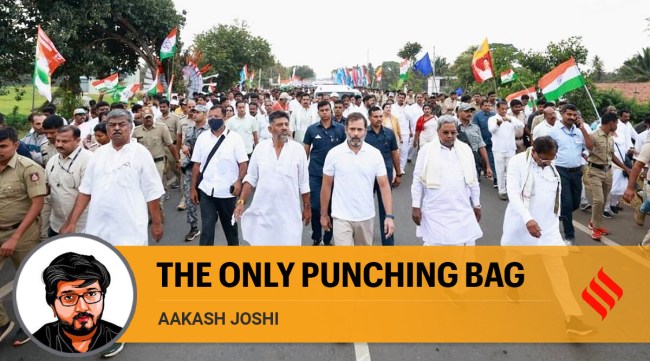Opinion Why liberals love to hate the Congress – and why it’s easy to do so
There is no cost to — or danger in — criticising the Congress.
 Rahul Gandhi marching on Day 10 of the Karnataka leg of Bharat Jodo Yatra.
Rahul Gandhi marching on Day 10 of the Karnataka leg of Bharat Jodo Yatra. Around the time that liberals, party well-wishers and a wide assortment of apolitical political pundits were expressing their ire at the “unofficial official” candidature of Mallikarjun Kharge for the Congress President, a “relatively minor incident” of Varanasi escaped their attention.
Mithilesh Kumar Gautam, guest lecturer at the department of political science at Mahatma Gandhi Kashi Vidyapith University, was sacked for tweeting that women would be better served by reading the Constitution and works of B R Ambedkar than by fasting during Navratri. The category confusion notwithstanding, such a statement would not have been a firing offence at another time and in many other places. But, unsurprisingly, the RSS-backed ABVP took offence to his words and the pliant university administration showed him the door.
The Congress, today, is barely the largest national opposition party. It has governments in just two states – Rajasthan and Chhattisgarh. Why, then, is it at the receiving end of attention, analysis, criticism and ire to a degree that the ruling party hardly ever is? Why is Rahul Gandhi scrutinised and criticised more than Narendra Modi? Why aren’t regional parties held to the same standards? Why is the grand old party expected to embody all the virtues that the English-speaking liberal read about in a political ethics textbook in the heady days of university idealism? The answer, perhaps, lies in the parable of Mithilesh Kumar Gautam.
But first, a little history.
Almost since Independence, the English-speaking Indian rarely, if ever, had to pay the price for his politics. Nehruvian, Libertarian, pro-Capital or Labour, the upper-caste elite that holds enormous sway even today over the public conversation found it easy to subscribe to grand narratives that did not, in fact, question their privilege. It is easy, for example, to believe that the injustices of the world are a function of market dynamics, of the invisible hand, rather than a function of structural inequality. Or that it is not a coincidence that the vast majority of CEOs and businessmen are upper-caste.
The first time this class was challenged was in the Mandal moment, when the vast majority asked for a share of public resources. That was when Hindu identity and the BJP juggernaut, not coincidentally, gained momentum. But, throughout the coalition years, NDA-1 and UPA, this elite – the liberal, sometimes left, sometimes not — continued to dominate the conversation. That has changed for the first time since 2014, and more pointedly, after 2019. Today, there are consequences to speech in India.
On the face of it, the upcoming election for Congress president could be hailed as a great step in inner-party democracy. It is rare for a political party in India to have an open election for its leadership. Yet, the critics insist, this election is not a “true” election. Kharge is the Family’s choice and therefore, somehow, a “puppet” without agency. Besides, the Nehru-Gandhis – dynasts certainly, but also politicians – should be so angelically impartial as to not even indicate with a sign their choice.
Political correctness, if nothing else, prevents most liberals from calling out the dictatorial tendencies of a Mayawati, or questioning the silence in Rashtrapati Bhavan at critical moments during the tenure of the last President. His and the current President’s belonging to socially and economically marginalised communities is rightly seen as a deeply progressive development. In fact, socialist parties as a whole, because of where their leaderships are situated in India’s unequal social system, are often seen as voicing the voiceless, and hence, beyond the kinds of criticism the Congress is subject to.
This in large part is justified. As the natural party of governance for the majority of the time since independence, Congress cannot claim underdog status. It is also a fact that it has been more or less moribund since 2014, and the Nehru-Gandhis must bear much of the responsibility for this. Yet, it is important to remember that it is not in power.
Take the Bharat Jodo Yatra, where much has been made of how much time Rahul Gandhi has spent in Kerala, a state where the Congress has some presence, rather than where it is weak. Is the Prime Minister questioned for being the chief campaigner in Gujarat, election after election? Trying to protect the bird in hand, attempting to keep the few seats it has, is not bad politics on the Congress’s part. And the liberal refrain was that Congress must go out on the street, and find a new idiom. Is the yatra not an attempt to do that? In the so-called battle of ideas, is scheduling an issue to be mired in?
But then, there is an obvious answer to why the Congress is subject to scrutiny, its actions nit-picked at: Had Mithilesh Kumar Gautam offended the NSUI instead of the ABVP, he would not be sacked. No one goes to jail for trolling “Pappu” (as no one should) but MPs using words like “corrupt”, “coward”, “criminal” and “crocodile” will be considered unparliamentary. There can be cases of defamation, of sedition, and even terrorism for saying the “wrong” thing, associating with the “wrong” people in the BJP’s New India. But there is no cost to – or danger in — criticising Congress. The Indian liberal, so used to engaging in high-minded rhetoric, only has one punching bag left. There is neither fear of consequence nor of the appearance of “punching down”. And while the country changes, often for the worse, it is easy to have someone to blame instead of taking responsibility.
aakash.joshi@expressindia.com





